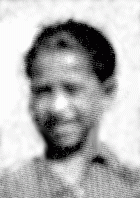
Johann (Hansi) Stojka
Born: 1929
Austria
Hansi, as he was called by family and friends, was the third of six children born to Roma ("Gypsy") parents who were Roman Catholic. The family wagon traveled with a caravan that spent winters in Vienna, Austria's capital, and summers in the Austrian countryside. The Stojkas belonged to a tribe called the Lowara Roma, who made their living as itinerant horse traders.
1933-39: Hansi grew up used to freedom, travel and hard work. He was 9 years old and their wagon was parked for the winter in a Vienna campground when Germany annexed Austria in March 1938. The Germans ordered them to stay put. His parents had to convert their wagon into a wooden house and their father and older sister began working in a factory. Hansi began attending school, and their family had to adjust to living in one place for the whole year.
1940-44: By 1943 Hansi's family had been deported to a Nazi camp for Roma in Birkenau. One day, his mother brought her to the infirmary with blood poisoning. She was terrified because she'd heard that prisoners might leave the infirmary "through the chimneys." But the next day, Hansi returned and told his mother a dream he'd had: "A beautiful women in white encircled me with warmth and cured me." His mother looked at the heavens, then at the smoking crematorium, and said prayers of thanks. The infirmary was a place of death, not healing.
Hansi was later deported to do forced labor at the Buchenwald and Flossenbürg concentration camps. He was freed near Roetz on April 24, 1945. After the war, he returned to Vienna.

